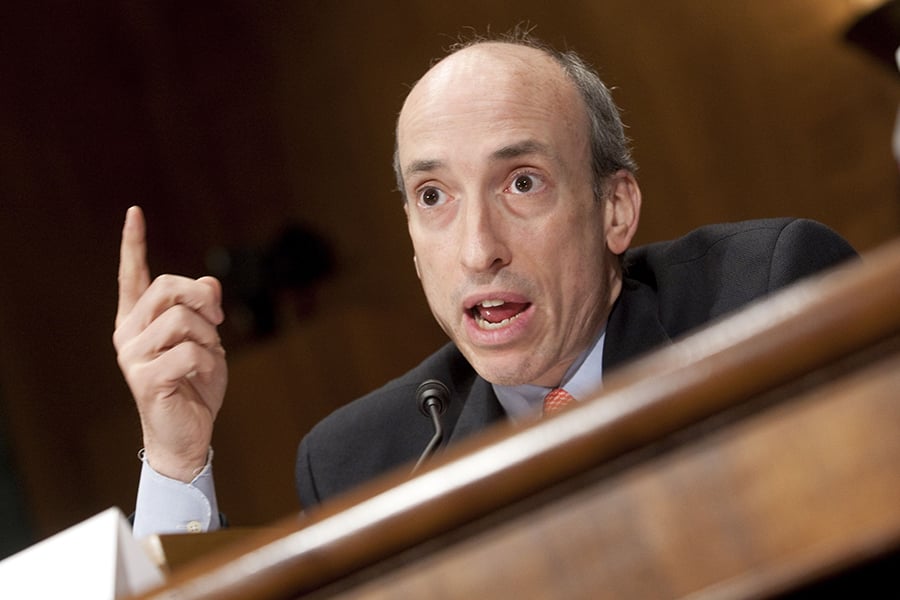

A recent addition to the staff of Securities and Exchange Commission Chairman Gary Gensler has one Republican lawmaker worried the agency will try to overhaul the broker standard of conduct.
Rep. Ann Wagner, R-Mo., pressed Gensler during a House Financial Services Committee online hearing Tuesday about his commitment to implementing Regulation Best Interest. Without mentioning her by name, Wagner seemed to be referring to Gensler’s hiring of Barbara Roper.
Roper, a former director of investor protection at the Consumer Federation of America, was appointed to Gensler’s senior staff in August to work on issues surrounding retail investor protection, including Reg BI. Roper, one of the most influential investor advocates, was an opponent of Reg BI, arguing it was too weak to curb broker conflicts of interest when making recommendations to customers.
“You have brought on staff [people] with a clear public record of opposing Reg BI,” Wagner said. “You can understand how that would give the investing public the impression that the SEC under your leadership is not committed to Reg BI.”
Wagner referred to an exchange she had with Gensler at an earlier hearing in which he said he would not seek to rip up Reg BI and start over. The regulation was implemented in June 2020.
“Do you still commit, sir, to fully supporting the continued implementation of Reg BI?” Wagner asked.
Gensler said he did, but left the door open to the SEC’s revising the measure.
“That is as true today as when I said it: To ensure that our regulations [and] Regulation Best Interest and others live up to what’s written down on the page and that investors … are getting the best interest when a broker is making recommendations,” Gensler said.
Wagner seemed satisfied.
“I’m relieved to hear that,” she said.
But later in the hearing, which was stretching on to three hours in the middle of the afternoon, Gensler elaborated on the possibility that Reg BI may be revised.
“I think that it’s important that this rule live up to its potential, that best interest really does mean best interest,” Gensler said in response to a question from Rep. Carolyn Maloney, D-N.Y.
Gensler said he would work with the agency’s examination and other divisions as well as Roper — referring to her not by name but as “an excellent person who is a senior adviser to me directly” — to ensure that “the retail public gets the best” and that brokers and investment managers understand their duties under the rule and “to ensure that best interest means best interest.”
A few moments later, Gensler returned to the topic unprompted in order to make sure he was getting his point across.
“We’re going to look to make sure that brokers ensure that the investing public truly gets best interest,” Gensler said. “So, I want to make sure that I put a real comment on that.”
As has been the case in each of his appearances before congressional committees, Gensler fielded several questions about the regulation of cryptocurrency.
Rep. Patrick McHenry, R-N.C. and ranking member of the committee, introduced a bill Tuesday that would provide a “safe harbor” and regulatory certainty for digital asset projects, as long as they meet certain conditions. He said it is modeled after a proposal by SEC Commissioner Hester Peirce.
“We have to have clarity in law around what is a digital asset,” McHenry told Gensler.
As he has at other congressional hearings and in speeches, Gensler reiterated that investors are vulnerable when it comes to cryptocurrencies.
“If we don’t oversee this and bring in investor protection, people are going to get hurt,” Gensler told McHenry.
In response to a question from committee Chair Maxine Waters, D-Calif., Gensler issued a dire warning about the consequences of the country breaching its debt limit. Republicans and Democrats are at loggerheads over lifting the debt ceiling, which will be reached on Oct. 18, according to Treasury Secretary Janet Yellen.
“The uncertainty would be very significant,” Gensler said. “We’d have significant volatility in the markets and we’d see breakage in the system.”

Cresset's Susie Cranston is expecting an economic recession, but says her $65 billion RIA sees "great opportunity" to keep investing in a down market.

“There’s a big pull to alternative investments right now because of volatility of the stock market,” Kevin Gannon, CEO of Robert A. Stanger & Co., said.

Sellers shift focus: It's not about succession anymore.

Platform being adopted by independent-minded advisors who see insurance as a core pillar of their business.

Firm grows assets to $12.27 billion with latest deal.
RIAs face rising regulatory pressure in 2025. Forward-looking firms are responding with embedded technology, not more paperwork.
As inheritances are set to reshape client portfolios and next-gen heirs demand digital-first experiences, firms are retooling their wealth tech stacks and succession models in real time.
